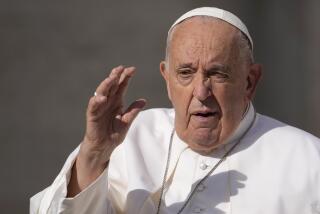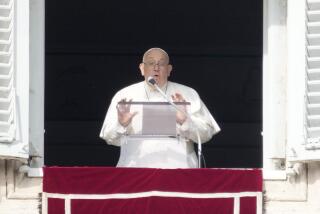A ray of enlightenment
- Share via
THIS WEEK’S pronouncement by U.S. Roman Catholic bishops on homosexuality is a cloud very much larger than a man’s hand, but it does contain a silver lining. The document reiterates the church’s opposition to same-sex marriage or civil unions and the adoption of children by gay or lesbian couples. With no hint of irony, the document ignores those condemnations when it laments that “more than a few persons with a homosexual inclination feel themselves to be unwelcome and rejected.”
The silver lining in the document is its refusal to endorse the notion, popular among some Christians, that homosexual orientation can be “cured” with a combination of willpower and “reparative therapy.” Significantly, the document says that “there is no consensus” on therapy.
Like “intelligent design,” another pet theory of the religious right, reparative therapy does have adherents with scientific credentials. But the consensus among psychologists is that sexual orientation is shaped early in life, if not before birth, and is usually not amenable to re-engineering, whether or not prayer is involved.
The bishops deserve credit for affirming that gays and lesbians “are created in the image and likeness of God and thus possess an innate human dignity that must be acknowledged and respected.” Yet such language undermines support for the church’s uncompromising attitude toward gay and lesbian relationships.
Misguided as it is, the belief of some Catholics and evangelicals that gays and lesbians can change their “ungodly” orientation through prayer or therapy at least assumes the existence of a world in which no one need be sentenced to a life without intimacy with another human being. By contrast, the seemingly more nuanced and tolerant view adopted by the Catholic bishops seems to acknowledge that same-sex orientation is neither evil nor a conscious choice -- but then it goes on to forbid the faithful from acting on that orientation.
To borrow a term from the church’s description of homosexuality, there is something “disordered” about this account of the lives and loves of gays and lesbians. And the bishops seem to recognize as much. Although the document adopted by the bishops opposes same-sex marriage or civil unions and the adoption of children by gays and lesbians, it says that members of the clergy should be willing to baptize the children of such couples if there is “a well-founded hope that the children will be brought up in the Catholic religion.”
Even as they defend traditional doctrine, the bishops see -- through a glass darkly, one might say -- that the children being welcomed into the fold belong to loving Catholic families, however untraditional.
More to Read
Sign up for Essential California
The most important California stories and recommendations in your inbox every morning.
You may occasionally receive promotional content from the Los Angeles Times.










